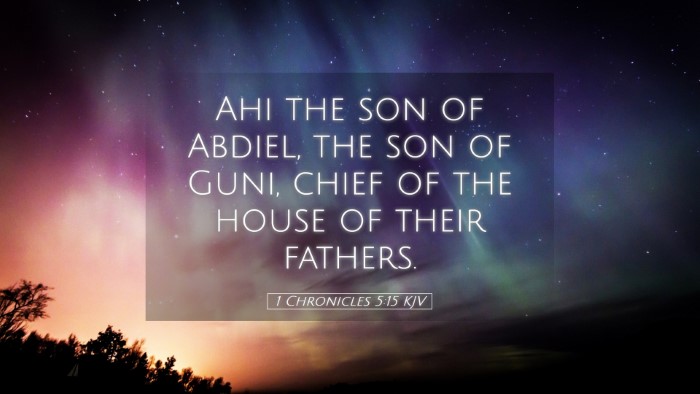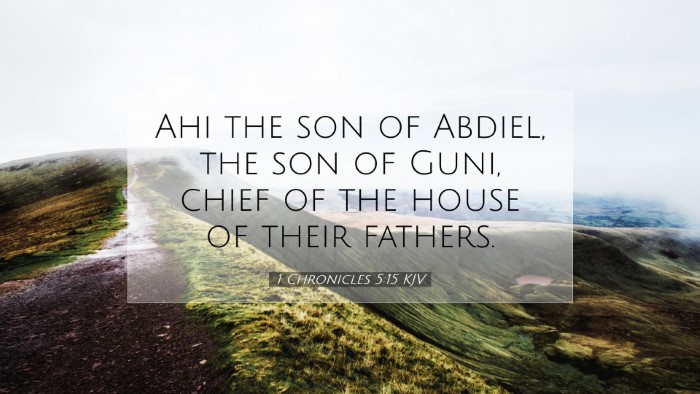Commentary on 1 Chronicles 5:15
Verse Reference: 1 Chronicles 5:15 - "They were renowned warriors, famous men, and heads of their families." (NIV)
Contextual Analysis
The Book of 1 Chronicles is a historical account that emphasizes the significance of the genealogies of Israel, particularly with respect to the tribes and their territories. In this context, verse 5:15 highlights certain individuals who were recognized for their valor and leadership.
Overview of Commentaries
This analysis draws upon the insights of prominent public domain commentaries, including those of Matthew Henry, Albert Barnes, and Adam Clarke, to provide a comprehensive understanding of this verse.
Insights from Matthew Henry
Matthew Henry emphasizes the military accomplishments of the individuals mentioned in this verse. He notes their renown as "valiant men" and underscores the importance of recognizing such leaders in the history of Israel. He suggests that their reputation was not merely due to their physical prowess but was also indicative of their commitment to defending their families and tribes.
Henry also draws a parallel between the qualities of these warriors and the spiritual warfare faced by believers today. He encourages pastors and theologians to reflect on the moral courage that is necessary in contemporary contexts, akin to the courage demonstrated by these ancient leaders.
Albert Barnes' Interpretation
Albert Barnes focuses on the significance of "renowned warriors" within the narrative of Israel's history. He notes that their fame did not solely derive from their military feats; rather, it was interwoven with the social and familial structures of the Israelite communities. Their leadership roles contributed to the stability and unity of their families and tribes.
Barnes further elaborates on the necessity of credible leadership in spiritual communities. He posits that the legacy of these warriors serves as a template for modern leaders who aspire to guide their congregations with integrity and strength. Their example calls for an understanding of leadership that extends beyond mere titles to embody genuine service and sacrifice.
Adam Clarke's Analysis
Adam Clarke provides a more detailed exploration of the cultural implications of being a "famous man" in the context of ancient Israel. He highlights how reputation was tied to family lineage and the collective memory of a tribe. Clarke posits that the mention of these notable individuals serves to inspire future generations to aspire toward greatness both as leaders and as faithful members of their communities.
Furthermore, Clarke challenges readers to ponder the legacy left behind by such figures and urges current leaders to cultivate virtues such as bravery, loyalty, and a commitment to the welfare of others. He asserts that in enhancing the physical and spiritual welfare of their communities, leaders continue the work initiated by these esteemed ancestors.
Theological Reflections
Together, these commentaries invite a deeper reflection on leadership, legacy, and the responsibilities that come with recognition. The essence of this verse transcends its historical context, offering timeless truths for present-day initiatives within faith communities.
- Leadership as Service: True leadership is characterized by service to others. The significance of these warriors lies not only in their achievements but also in their dedication to their people.
- Valour and Spiritual Warfare: The courage to stand firm in one’s convictions impacts both individuals and communities. The modern believer must also engage in spiritual combat, emulating the bravery of these historical figures.
- Legacy of Faithfulness: Every church leader today has the opportunity to build a legacy that honors God, just as these famed warriors did in their time.
Conclusion
In summary, 1 Chronicles 5:15 serves as a reminder of the significant role of leaders within the community of faith and highlights the qualities that contribute to a lasting legacy. By understanding the context and insights from various commentaries, pastors, students, theologians, and Bible scholars are encouraged to reflect upon their roles as leaders and the impact of their service in advancing the gospel message.


